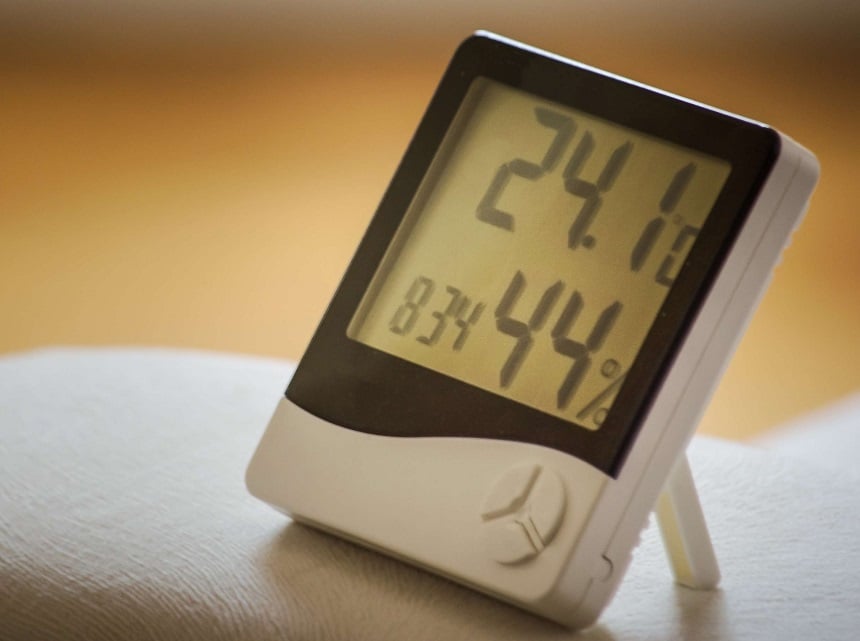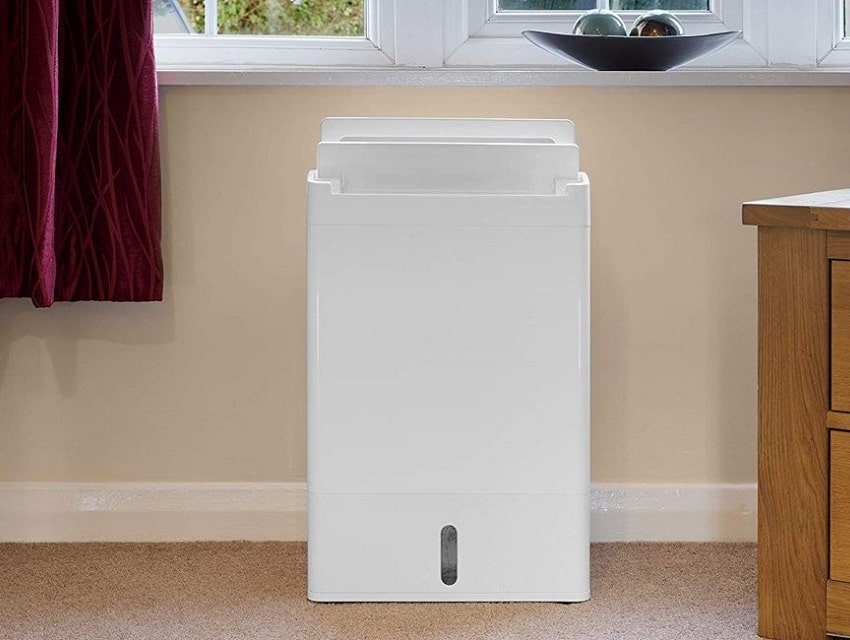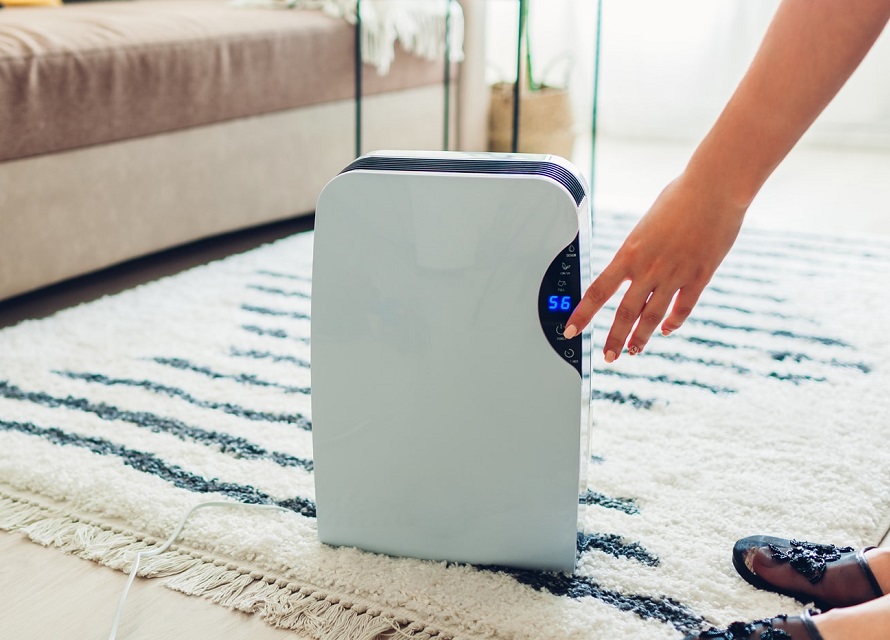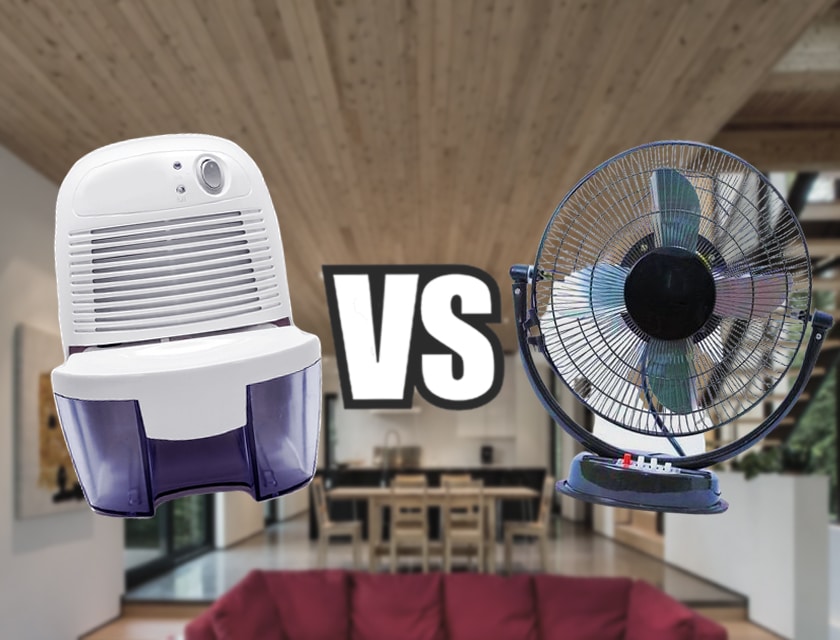Many people have been left asking themselves why is my house so humid? That’s exactly what we want to answer for you here today.
You need to maintain a certain humidity level in your home but too much of it can start to cause health issues, especially if you are suffering from allergies or asthma. High moisture levels in the air can cause them to flare up, lead to other issues or simply make you uncomfortable. It’s important to get the right level of moisture control.
High humidity also promotes the growth of mold, which can cause further respiratory issues. Additionally, the moisture in the air can cause your electronic appliances to malfunction, shortening their lifespan and resulting in costly repairs or replacements.
With all these potential issues, it’s no wonder that you want to know why your home is so humid. Here we’ll take a look at the causes of humidity in your home, what is the right level and how you can lower it. Let’s get started!
One of the easiest ways to notice humidity is by looking for visible condensation on cool surfaces like windows or anywhere in your basement. You can also look for discoloration and wet patches on your ceilings, walls, or floorboards.
If you are looking for a more precise way of measuring humidity levels, you can do that with a hygrometer such as the ThermoPro TP55 Digital Hygrometer. Our experts recommend this due to its high accuracy while also providing plenty of other useful information.
You can use it to determine the exact moisture level inside your home. This could be really helpful if you suffer from severe allergies or asthma and need to maintain a certain percentage of humidity at all times.

You have to remember that it’s not just high humidity that is harmful to your health. Low humidity causes as many detrimental health effects as does high water vapor levels. Instead of drying out the air completely, you should opt to achieve a healthy balance in humidity.
A humidity level of around 45-50% inside a house is considered optimal and it’s fine if the figure is around 15% either side of that. If it’s move 70%, you will need to reduce it with a high-quality dehumidifier. Or if it’s less than 30%, you will need to raise it.
Moisture contributes to the growth of bacteria, dust mites, and mold, all of which cause allergies, which is the most common side effects of humidity. In rare cases, prolonged warm, damp air will cause black mold to appear.
Additionally, the humidity will interfere with your body’s thermoregulation, as it won’t be able to cool down by sweating. Because of this, you will sweat even more and lose a large amount of much-needed water from your body.
Sweating will also make it impossible for you to sleep, which along with the vapor, can cause frequent headaches as well.
The main reason for humidity is the climate you live in. If you’re wondering why is my house so humid in summer then it will be the fact that the sun is evaporating all the moisture. Thinking why is my house so humid in winter? Well, that could be your heating system trapping all the moisture in your home.
If it’s really humid outside, even if you close all the doors and windows, the stuffy air will still flow into your home through the walls unless you have something to regulate it. Plus, it will get into the soil under your home and enter it through the floors of your basement. The basement can be the best place to place a high-quality dehumidifier.
What are the other causes of high humidity in house? The primary source of what causes humidity in a house could simply be outdoor air leaking into your home through some duct work as well. Check them for leaks if you have any humidity problems.
The vapor can come inside your home as well. For example, if you take at least one long hot shower a day without running a bath fan during and after, you will have excess humidity in your home for days.
All the appliances that use water, such as washers, dryers, dishwashers, or cooking machines, can also attribute to high humidity levels. Not to mention air-drying your laundry inside your home.
Wondering why is my house so humid with the AC on? Well, the worst part is that this can happen even if you use an AC fan if it’s old or it’s the wrong size. Each time you use a clothes dryer, take a shower or open a window, more vapor will get inside your home than the AC manages to remove.
Gas heaters can also cause humidity problems because as they burn gas, they make water vapor. A gas heater with a flue or chimney should carry the moisture to the air outside the home. But if the heater doesn’t have a vent and you don’t let enough fresh air in, all the water will stay inside your rooms.
While you can’t do much to lower outside humidity levels, you can make your home more comfortable by reducing the inside moisture levels. There are many ways to deal with humidity inside your home, such as using a high-capacity dehumidifier, but it’s important to first know the cause of the issue.
Once you do that, you will know which solution to employ to remedy your issues. And remember, not all the reasons will be the same during winter as did the summer, so you may have to change your tactic as the seasons change.
If you’re wondering why is the air in my house so humid, then here are a few things you can do to change it.
In case your humidity problem originates from your basement, attic, or laundry room, it might be a good idea to place a dehumidifier in those places. When properly used, dehumidifiers can remove a lot of excess moisture from the air because they can run day and night.
You can get large-scale dehumidifiers for your entire property as well. However, as these devices work best when a room or area is completely sealed off, it’s best to keep them when they are needed the most. Additionally, to ensure proper airflow, you will have to keep your dehumidifier away from any walls or objects.
If you need a solution close to a window then our experts suggest the Easycool Window Conditioner by Midea as it’s easy to install and available in a wide range of power options. For those looking for something a little more portable, the hOmeLabs Energy Star Dehumidifier would be ideal due to its impressive versatility.
From the video below, you will know what’s inside a dehumidifier and how it works.
It’s always a good idea to properly ventilate your home, but this is even more important for areas where a lot of vapor created, such as the kitchen and bathrooms. Opening a window or two can be a solution to get rid of the moisture, but exhaust fans work a lot faster.
If you don’t have any fans yet, you should definitely install some in the problem areas. By turning them on and leaving them on for at least half 30 minutes when there’s moisture in the room, you will be able to decrease your home’s humidity level significantly. Another option could be to take shorter or much cooler showers when it’s time to get clean.
Besides cooling down the air inside a home, air conditioners also remove moisture and humidity. But to get the most of an AC, you will need to pay attention to a couple of things. First, you will need to make sure the unit you have installed or planning to install is the appropriate size for your home.
If it’s too big, the compressor will allow it to run for only a short period, which won’t be enough to remove all the humidity from the air. A similar problem can also occur if the AC is just too small to work efficiently.
Also, you will need to perform routine maintenance and regularly replace the filters on your air conditioner, as clogged filters can stifle airflow. They can actually make the moisture stick to them instead of getting rid of it.
You can always reach out to a professional like Home Climates to assess your current system and help you determine if it’s right for your home and family.
Water condensation can cause a problem when there is a big difference between the temperature of your water pipes and the air inside your home. This usually occurs on cold water pipes, further contributing to your humidity problems.
You can get ready-made insulation pads for piping at any hardware store and keep this from happening on the cold water pipes when the outside temperatures are hot. This also eliminates heat loss between the hot water heater and the tap, so it will even save you money by reducing your utility bill as well.
If you live in an area where the climate is overly humid all year round, it might be a good idea to place insulation foam on your walls around your home as well. Besides not letting water in, this will help control the inside temperatures, which will lower your heating or cooling costs.
Weatherstripping is essentially placing insulation around the frames of the doors and windows of your home. It creates an air-tight seal to prevent cool or warm air from escaping and prevents excess humidity from flowing inside. This not only protects your windows from mold and mildew but also stops moisture from spreading on the walls and other furniture.
Caulking works the same way as weatherstripping, except it’s used to line surfaces that usually come into contact with moisture. Some of these are faucets, sinks, toilets, tubs, windows, and inseams. Weatherstripping and caulking need to be done on both the inside and the outside edges of windows and doors. And if you had them done already, but you have noticed that the seal is breaking down or deteriorating, you will need to replace it as soon as possible.
If you notice it’s breaking down or deteriorating, you can replace it fairly easily or call a professional. Do so, sooner rather than later.
Below are six things you can do to reduce humidity in your home.
Carpet and rugs are known sources for allergens even without humidity. With high levels of moisture, they can even become moldy and cause serious health issues. Remove the carpet in your home and replacing it with tile or wood flooring can remedy this issue.
If you are worried about your feet being cold during the winter, you can always install floor heating. This also helps reducing moisture levels, so you will get double benefits from it.
Wallpapers can also trap moisture, spreading towards the inner surface of the wall. The same is true for vinyl coverings, especially if they are on the floor. And if they are put on a larger area, the moisture can ruin the entire surface, plus aid the growth of dangerous molds.
Try painting your walls with water-resistant paint instead to protect them and prevent the vapor from sticking to them as well.
Wooden furniture can also retain a lot of moisture, especially in the kitchen or bathroom areas. For this reason, you will need to make sure your cabinets have a high-quality protective finish to prevent the water from getting inside.
While having lots of houseplants can be healthy because of all the oxygen they produce, they can also contribute to your humidity issues. If possible, keep them outside your home as much as possible to reduce the vapor, unless they are the kind of plant that actually collects moisture.
If you want to keep your plants, then at least try not to keep all of them in the same room, particularly not close to the window or door. Keeping plants in a colder room is also healthier for them during the colder months.
You may find the solution to your humidity issues by monitoring the drainage system around your home. If it’s inadequate or clogged, it can cause rainwater to flow toward your foundation and leak into the structure. You will either need to clean it or replace it while directing the water away with an efficient draining system or landscaping.
If you have a basement, be sure there are no cracks in the wall and if there are repair them as soon as possible. You can also coat the underground walls with Xypex or Drylok to prevent excess moisture from seeping in.
Make sure any and all crawl spaces are also insulated with a plastic vapor barrier. Your basement can be one of the biggest causes of high humidity in the home so it’s a good idea to inspect it to see if there are any problem areas.
Many people have been left asking themselves why is it so humid in my house? As we’ve seen here, there are many potential reasons that your home may be humid. This is especially a problem if the air outside isn’t even humid.
High humidity in the home can happen in summer or winter and if it does, then it’s time to investigate. If you constantly struggle with humidity then it’s probably the best idea to get a dehumidifier. There are many brilliant options on the market that are going to make your life a lot more comfortable.
Hopefully by now, we’ve answered the question of why is my house so humid. You can now take the steps you need to reduce the humidity and enjoy all the great benefits that it brings.





